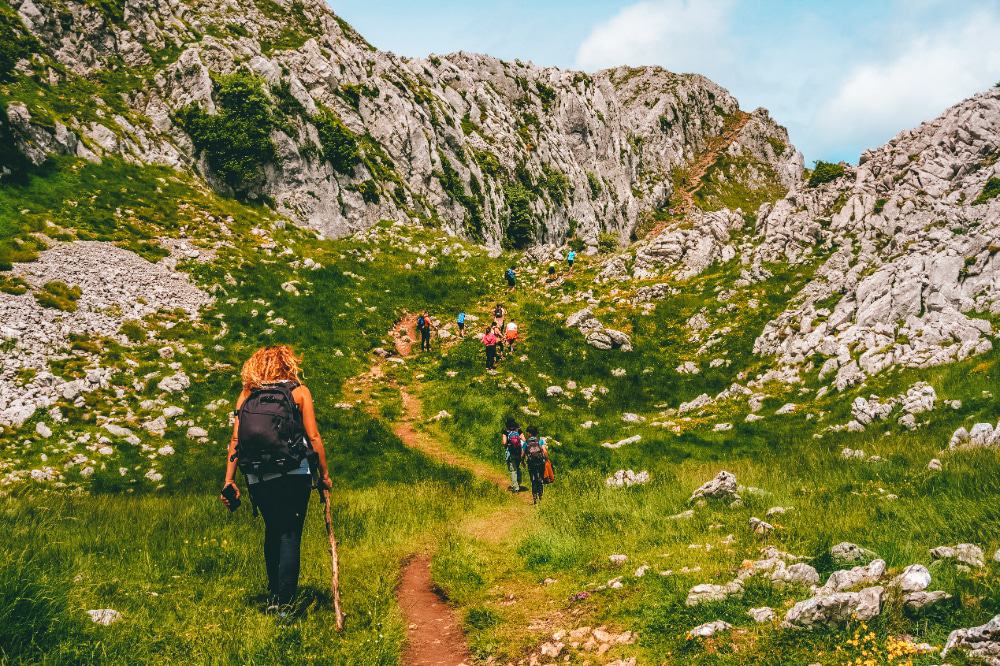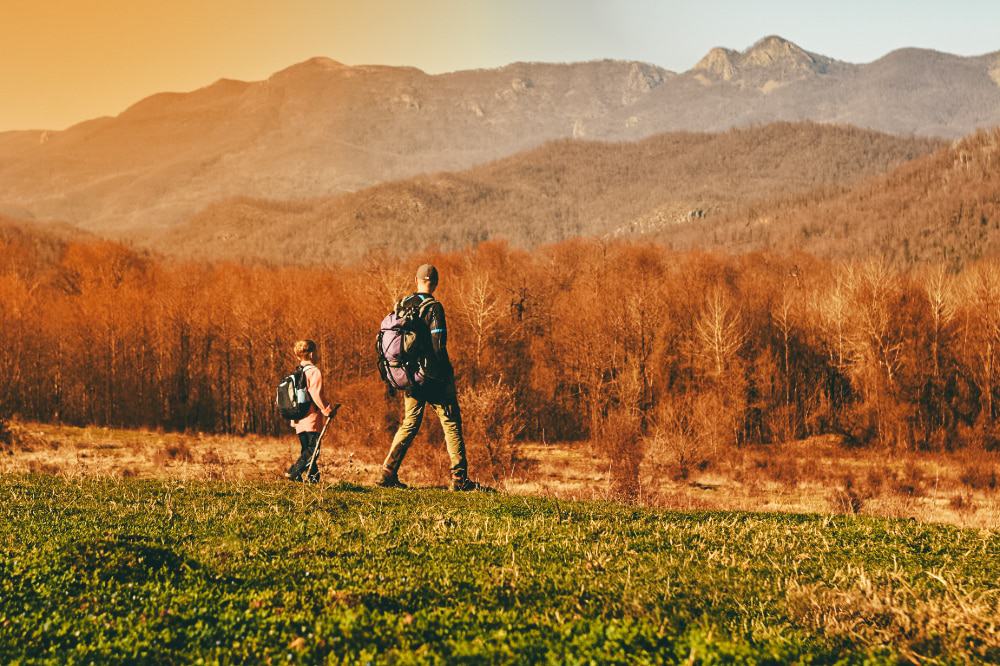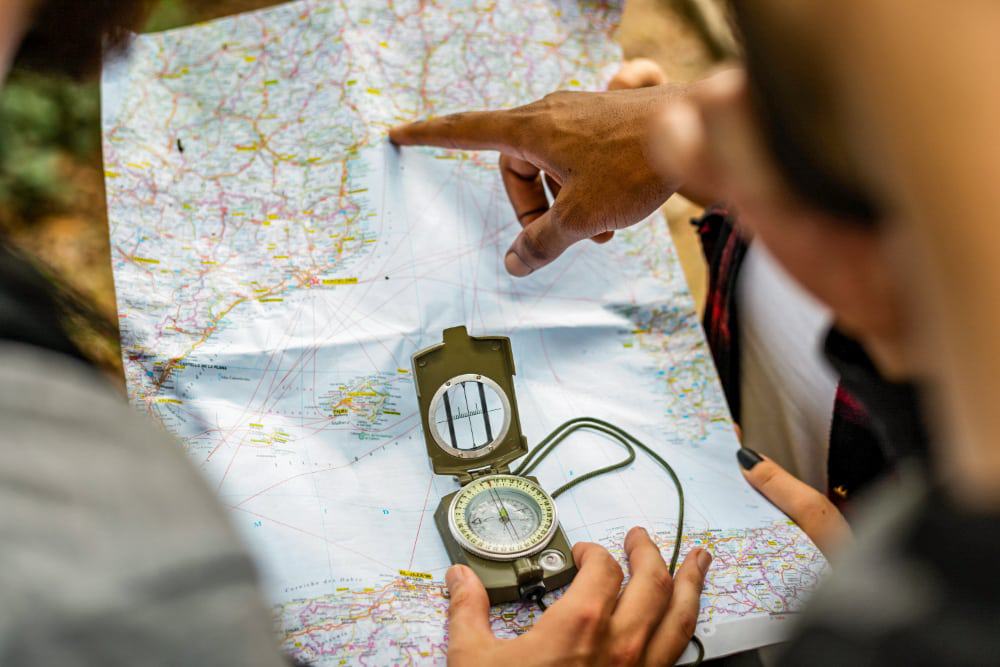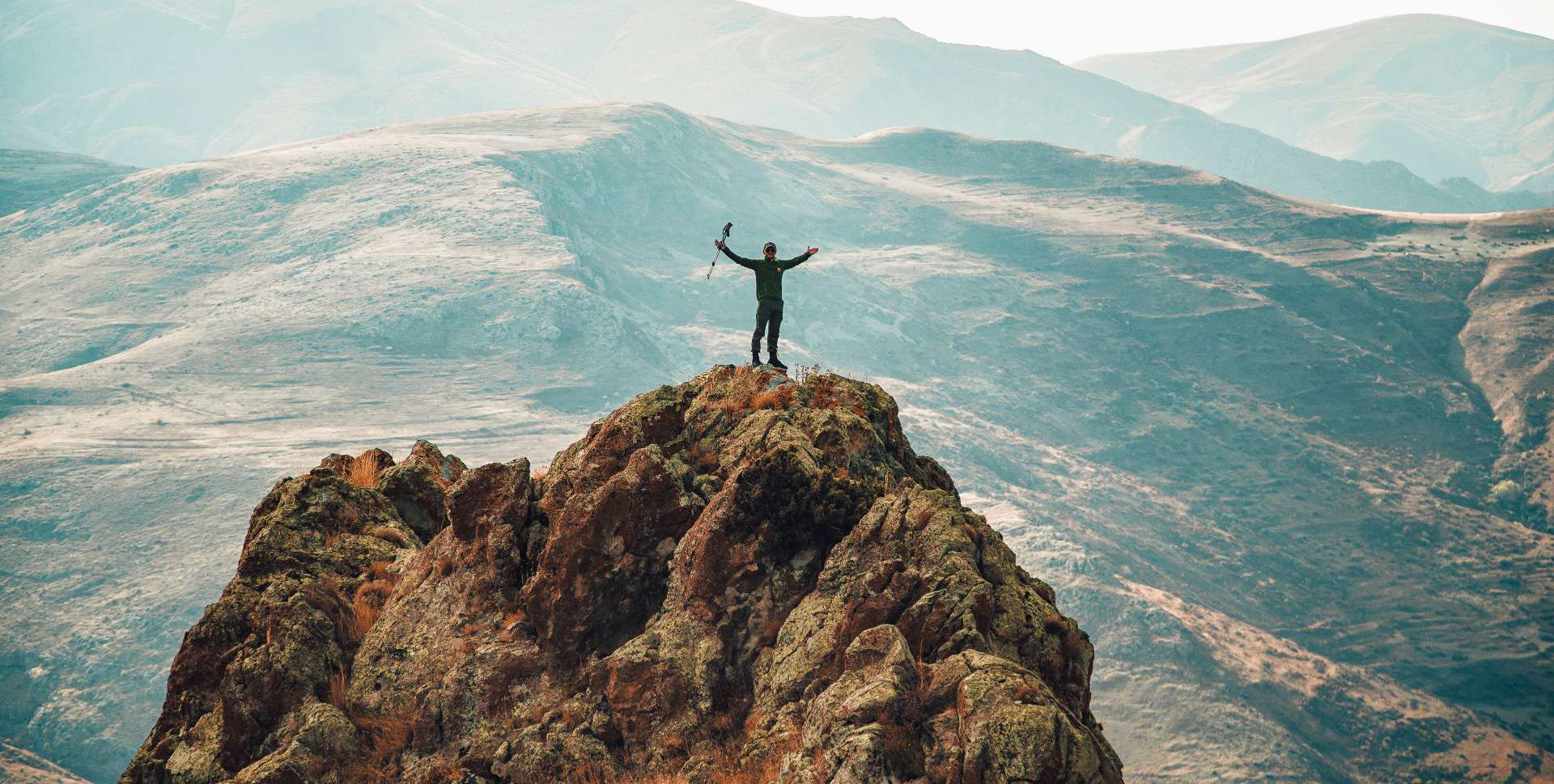Hiking exists as a continuum. From a gentle stroll on a path in the woods to climbing up a mountain, it takes many forms.
Physical activity and exercise have a wide range of health benefits. However, hiking is special in that it offers an opportunity to combine the health benefits of physical exercise with the benefits of being outdoors among nature.
This means that hiking isn’t just great for your body, it’s great for your mind too!
Hiking has been shown to improve a range of health issues by reducing blood pressure and stress but how much do you need to do to get these benefits?
Do you need to commit every weekend to trek up hills or is once a month enough? Is it better to go alone or with other people?
If you want to get the most out of your hiking experience, we’ve got the science (and experiences!) to show you how.
Going hiking isn’t just a fun day out, it also comes with lots of potential benefits for your health and wellbeing:
- Keeping fit and in shape
- Strengthen your heart
- Get a good night’s sleep
- Manage diseases like diabetes and osteoporosis better
- Reduce your stress levels
- Manage mental health issues
- Boost your happiness
- Bond with your family
- Enhance your memory
Related: Give this a shot with your partner – get started with the best 10 person camping tents.
Benefits for Physical Health
Get in Shape!
Obesity and severe obesity in the USA have been increasing since 2000 [1] with recent surveys finding 42.4% of the adult population obese.
Hiking is a fantastic form of physical exercise that burns calories. Alongside a healthy diet, this is a key part of losing weight and reducing obesity.
A key characteristic of hiking is the uneven terrain outside urban environments. Smooth surfaces cost less energy to navigate [2], meaning hiking is more strenuous than walking.

30-minutes of hiking for the average American burns between 223-266 calories [3]. This is equal with 30-minutes of swimming and about 40 calories higher than other outdoor sports like kayaking and whitewater rafting.
Tip: If you’re thinking about taking up hiking to lose weight, consider getting some poles or walking sticks to help with balance.
After a 12-week study into the effects of trekking exercise on health benefits in older obese women, Dr. Kang found [4] that hiking played a significant role in the reduction of weight among the participants. They also recorded lower blood pressure.
Research on using hiking as a tool to fight childhood obesity found [5] that alongside a strict hypocaloric diet (low calorie) the activity played a relevant role in weight loss.
Hiking isn’t just good for weight loss – it’s also a great leg and core workout! Trekking up and down hills gives your legs a real workout. And if you’re carrying a backpack, you will engage your core as you balance yourself with the extra weight.
In the US, Walk With a Doc [6] has spread to 47 states. It offers free physician-led community walks in the name of public health. These walks can be a good way to build up to longer hikes.
Related: Looking for a huge tent for the family to spread out in? Check out our reviews of the best 12 person tents is.
A Healthy Heart
Almost 1 in 4 deaths in America [7] are the result of heart disease, with someone having a heart attack every 40 seconds.
It has been established that increasing physical activity can help prevent and manage cardiovascular disease. A recent study [8] found that as the amount of walking decreased among participants, the risk of cardiovascular disease increased.
Hiking through a forest has been shown [9] to decrease systolic blood pressure by 1.4% and heart rate by 5.8%.
A sedentary lifestyle will increase the likelihood of developing cardiovascular problems. Hiking is a form of physical exercise accessible to many people that can alleviate the risk caused by a sedentary lifestyle.
Tip: Hiking with pre-existing heart conditions can be dangerous – one of the biggest causes of death in the wilderness [10] is cardiac arrest. So be careful not to push too hard, too fast.
Related: Picking the perfect tent often means taking your group size, and adding a few to the capacity so that there’s room for gear and room to spread out. Check out our review of the best 8 person tent – the perfect size for a family.
Sleep Quality
The number of Americans not getting their recommended daily amount of sleep has quadrupled from the 1940s. 4 in 10 Americans [11] don’t get enough daily sleep compared with 11% in 1942.
Good quality sleep is important to your physical health. It is part of the process of healing and repairing your body and sleep deficiency is linked to an increased risk of several diseases including heart disease, kidney disease, and diabetes [12].
Review and meta-analysis of research into sleep quality found [13] that exercise was beneficial without any notable adverse effects that medication can have.
Looking at the effects of hiking specifically, research from Japan [14] has found that hiking in a forest improved the sleep pattern and quality of participants. Participants hiked in a forest for two hours for eight weekends and reported better and longer sleeping.
The authors propose this was due to the increased physical activity and improved emotional state of participants.
Diabetes
The prevalence of diabetes [15] in the adult population globally has increased from 4.7% in 1980 to 8.5% in 2014.
Diabetics are split into type 1 who don’t produce insulin and type 2 who don’t respond to insulin as well as they should (and often later cannot make enough insulin). 9 in 10 diabetics are type 2 [16].
An 8-week study into the effects of aerobic exercise (specifically high-intensity walking) on insulin resistance produced promising results [17].
The physical activity was effective in promoting amelioration of insulin sensitivity. This meant that their bodies were better able to respond to insulin and control their blood sugar.
However, in a review of resistance training [18] and type 2 diabetes, it was found that aerobic exercise (like walking and hiking) was less beneficial to glucose metabolism and weight loss.
The role that hiking can play in regulating and controlling diabetes for type 2 patients appears to be limited with resistance training offering a more productive outcome.
But hiking has other benefits and the influence it plays on insulin sensitivity might still be important for some people.
Healthy Bones
Age or inactivity can weaken your bones and lead to health issues like osteoporosis and arthritis. Hiking is a weight-bearing exercise that works to strengthen muscles but there is some research to suggest it might be important to strong bones as well.
Postmenopausal women are at high risk of osteoporosis. An early study conducted over a year [19] argued that a program of walking did not prevent the loss of spinal bone density in postmenopausal participants.
A follow-up study [20] then argued that postmenopausal women who walked a mile each day had higher whole-body bone density than women who walked shorter distances. These results suggested that walking was an important activity for maintaining skeletal integrity.
A 2018 paper into exercise and bone density claimed [21] that it was an effective part of strengthening bones in postmenopausal women. But the optimal training program was still unclear, as was the minimum exercise required to gain benefits.
Overall, I would be hesitant over this issue. Whilst there is some research to suggest that exercise like hiking can improve bone density and strength, it is not conclusive.
Tip: If you suffer from osteoporosis or have weak bones, take care not to fall when hiking and risk a break or fracture. Stick to trails and keep safe!
Benefits for Mental Health
Less Stress
In pressure situations, our body produces hormones (like cortisol) that trigger our internal fight or flight response to deal with a perceived threat. This is what causes stress and can lead to feelings of being unable to cope with mental or emotional pressure.
Continuous stress can have deleterious effects on our physical and mental wellbeing. Some studies have measured physiological changes and self-reported stress levels to show that stress can be decreased by hiking.
Cortisol, blood pressure, pulse rate, and heart rate (all indicators of stress) were measured before and after a walk in a forest in Japan and found [22] to have dropped after the activity. However, these indicators also dropped after just viewing the forestry scenery.
The paper does suggest however that the environmental benefit may be the driving factor rather than the physical activity of hiking. Whilst hiking might be a relaxing activity, this would suggest it isn’t the action of hiking but the setting of nature.
So it turns out that nature has a naturally calming effect that helps you center your mind! This is just one of the benefits of being outside you can enjoy whilst hiking. There’s also evidence it can boost your creativity, improve your immunity, and prevent eyesight deterioration in children.
However, research on stress-related physiological responses [23] to mountain hiking has found cortisol, blood pressure, and heart rate were all decreased by hiking outdoors and indoors. These authors argue that the environmental impact is therefore less deterministic.
The relationship between physical activity, environmental setting, and stress is not clear cut. But it can be said with a fair amount of conviction that indications from the research suggest that hiking can be beneficial to reducing stress.
Mental Health Issues
Promising research has been published on the effects of hiking as an add-on therapy to ongoing care on high-risk suicide patients.
Researchers found [24] after a 9-week program that participants reported a decrease in feelings of hopelessness, depression, and suicidal ideation. A follow-up study [25] using similar methods over a 9-week program found consistent results.
Another recent study [26] researched physical activity and suicidal ideation among older people. However, the researchers did not use hiking as a form of physical exercise. They did not find a consistent linear relationship between physical activity and decreasing suicidal thoughts or attempts.
The authors argued that physical activity should still be considered as potentially contributing to the reduction of suicidal ideation.
This might suggest that hiking is a particularly useful form of physical exercise for helping as part of a treatment for mental health issues.
“It’s not the mountain we conquer, but ourselves.”
Jenny Bruso, founder of Unlikely Hikers (an inclusive outdoor recreation community) warns against viewing nature as a “cure-all” to mental health issues, however [27].
She feels the impact nature made on her mental state made her life liveable again. But she is worried that overzealous recreationists may be minimizing the reality of the ongoing mental health crisis.
Outdoor adventure is not, and should not be trialed as, an alternative to professional mental health care. But engaging in activities like hiking can be an effective part of treatment and care.
Mood Boost
Research from Japan has found [28] that daily walking has a variety of benefits including improved mood states. Walking, essentially, makes us happier.
After a 50-minute walk in a natural environment, participants in a study in California reported [29] lower levels of anxiety and rumination compared with participants who walked through an urban setting.
Another study [30] that used self-reported rumination and neural activity in the area of the brain associated with negative emotional responses as indices found a 90-minute walk in nature was beneficial for both measures.
Generally, we are happier when we are connected with nature and when we are engaged in physical activity. Hiking is a very effective stone for killing two birds.
Related: Don’t just read – take action! Check out our guide to the best 6 person tents for going outdoors and take your family or friends with you!
Social and Developmental Benefits
Family Bonding
The positive association between outdoor recreation and family cohesion has been consistently reported in research [31].

In their analysis of vacation activity and family cohesiveness [32], Lehto et al. argue that nature seeking vacationers who regularly engage in outdoor activities like camping and hiking are the most well bonded.
Recent research found [33] that a 20-minute walk in a natural setting was enough to restore individual attention and dyadic cohesion between mothers and daughters.
Family hikes aren’t only a great way to bond as a family. They are an opportunity to pass on skills and knowledge. Use the time to educate kids on the Leave No Trace principles and show them how to use a map.
I owe a lot to family hiking trips. Not only did I learn vital navigation skills like map and compass reading but going on treks from a young age inspired my love of the great outdoors.
Tip: Rotate the leader to give the kids some responsibility and show them you trust them
Hiking isn’t just for families, of course. I love going hiking with friends as well! It can be a great opportunity to connect with each other without the distractions of modern life.
Maintain Your Memory
The hippocampus is the brain structure that mediates memory. It evolved for geonavigation to help us remember where we are going and points of interest like good foraging spots. Without being exercised, the hippocampus can atrophy.
When hiking on uneven surfaces and through the wilderness, your brain has to make micro- and macro-adjustments to your route constantly that keeps your brain sharp. Hiking offers an opportunity to exercise a part of your brain that needs a workout.
Tip: Most people get lost by wandering off the trail when hiking [34], so stick to your path to avoid losing yourself out there!

In a study by the University of Michigan [35], participants were given a short memory test and then divided into two groups. One took a walk through a botanical garden and the other down city streets.
After returning, participants took another brief memory test. Those who had been on the nature walk scored 20% better than their original test whilst the urban control group saw no consistent increase.
Research into the effect of aerobic exercise on hippocampal volume in older women found significant increases caused by the intervention of physical activity [36].
More research needs to be done but indications from studies suggest that natural environments and physical exercise are beneficial to memory function.
Wrapping It All Up
Unlike other outdoor pursuits (like river rafting) that can take advantage of the benefits of being in nature, hiking requires little time or commitment.
It has great benefits for your health and wellbeing, so there’s no reason not to give hiking a chance!
References
[1] https://www.cdc.gov/nchs/products/databriefs/db360.htm
[2] https://www.ncbi.nlm.nih.gov/pmc/articles/PMC4236228/
[3] https://www.health.harvard.edu/diet-and-weight-loss/calories-burned-in-30-minutes-of-leisure-and-routine-activities
[4] https://www.ncbi.nlm.nih.gov/pmc/articles/PMC4157929/
[5] https://www.ncbi.nlm.nih.gov/pmc/articles/PMC7096559/
[6] https://walkwithadoc.org/
[7] https://www.cdc.gov/heartdisease/facts.htm
[8] https://www.ncbi.nlm.nih.gov/pmc/articles/PMC6549420/
[9] https://pubmed.ncbi.nlm.nih.gov/21996763/
[10] https://www.ncbi.nlm.nih.gov/pmc/articles/PMC1304948/
[11] https://news.gallup.com/poll/166553/less-recommended-amount-sleep.aspx#:~:text=Americans%20currently%20average%206.8%20hours,nine%20hours%20sleep%20for%20adults.
[12] https://www.nhlbi.nih.gov/health-topics/sleep-deprivation-and-deficiency#:~:text=Sleep%20plays%20an%20important%20role,pressure%2C%20diabetes%2C%20and%20stroke.
[13] https://www.ncbi.nlm.nih.gov/pmc/articles/PMC6045928/
[14] https://www.ncbi.nlm.nih.gov/pmc/articles/PMC3216244/
[15] https://www.who.int/news-room/fact-sheets/detail/diabetes
[16] https://www.diabetes.org.uk/professionals/position-statements-reports/statistics
[17] https://pubmed.ncbi.nlm.nih.gov/25560330/
[18] https://pubmed.ncbi.nlm.nih.gov/19135754/
[19] http://sciencedirect.com/science/article/abs/pii/8756328288900312
[20] https://www.sciencedirect.com/science/article/abs/pii/0002934394901112
[21] https://www.ncbi.nlm.nih.gov/pmc/articles/PMC6429007/
[22] https://pubmed.ncbi.nlm.nih.gov/19568835/
[23] https://www.mdpi.com/1660-4601/14/8/905
[24] https://pubmed.ncbi.nlm.nih.gov/22486584/
[25] https://pubmed.ncbi.nlm.nih.gov/23953873/
[26] https://pubmed.ncbi.nlm.nih.gov/31223536/
[27] https://www.outsideonline.com/2395502/outdoors-are-not-apolitical
[28] https://www.jstage.jst.go.jp/article/jpa2/25/4/25_4_281/_article/-char/ja/
[29] https://www.sciencedirect.com/science/article/abs/pii/S0169204615000286
[30] https://www.pnas.org/content/early/2015/06/23/1510459112
[31] https://www.tandfonline.com/doi/abs/10.1080/00222216.1970.11970005
[32] https://www.tandfonline.com/doi/abs/10.1080/10548408.2012.730950
[33] https://www.jstor.org/stable/10.7721/chilyoutenvi.27.2.0093?seq=1
[34] https://www.nationalgeographic.com/adventure/2019/04/hikers-survival-tips/
[35] https://journals.sagepub.com/doi/10.1111/j.1467-9280.2008.02225.x
[36] https://bjsm.bmj.com/content/49/4/248.abstract?sid=ecff0a48-d4fd-4a9d-b34a-156ca915a79e
Further Reading
Abbott, E. (2020) How hiking can make you mentally and physically stronger, https://thehill.com/changing-america/well-being/487084-how-hiking-can-make-your-mentally-and-physically-stronger
After hiking 10,000 miles through the backcountry, Lauralee Bliss has some insights from her experiences to offer.
Berman, M. G., Jonides, J., & Kaplan, S. (2008). The Cognitive Benefits of Interacting With Nature. Psychological Science, 19(12), 1207–1212. doi:10.1111/j.1467-9280.2008.02225.x
A review of the cognitive benefits of interacting with nature either through viewing landscapes or hiking in woodland.
Littlejohn, H. (2017) The Benefits of Hiking Alone, https://www.rei.com/blog/hike/benefits-hiking-alone
Haley offers a personal perspective on her experiences hiking alone as a woman. Her passion for solo hiking is inspiring and she doesn’t shy away from challenging outdated ideas about what exactly women are able to do in the outdoors.
Mitten, D., Overholt, J. R., Haynes, F. I., D’Amore, C. C., & Ady, J. C. (2016). Hiking. American Journal of Lifestyle Medicine, 12(4), 302–310. doi:10.1177/1559827616658229
A review of hiking specific research and how it can promote health benefits.
Smokey Mountains, https://smokymountains.com/safe-and-found/
A guide to staying safe if you get lost when hiking that includes personal accounts.
Warburton, D. E. R. (2006). Health benefits of physical activity: the evidence. Canadian Medical Association Journal, 174(6), 801–809. doi:10.1503/cmaj.051351
This paper offers a review of all the health benefits of physical activity broadly, providing a foundation for a better understanding of how hiking can be beneficial.
Winegarden, D. P. (2016) 6 Whole-Person Wellness Dimensions, https://agingwithfreedom.com/2016/04/20/wellness-dimensions/
A fantastic article that highlights the need to go beyond just considering our physical health when dealing with our overall wellness and happiness.
